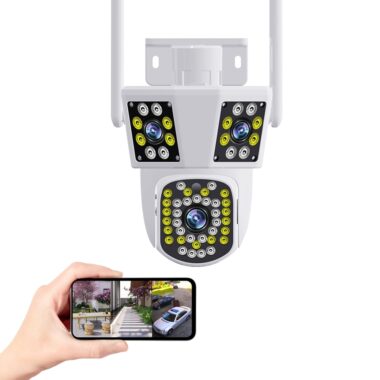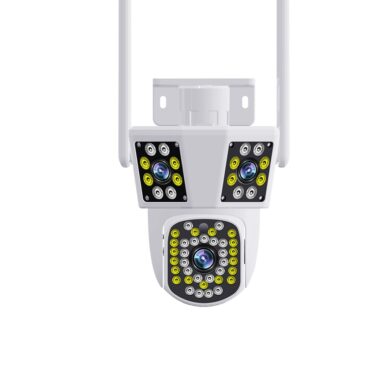📌 Introduction
Selecting the right CCTV camera manufacturer is not just about finding a company that can assemble parts—it’s about choosing a strategic partner who understands your market, your brand, and your long-term goals. In the security industry, product reliability, customization flexibility, and production efficiency are what define a strong supplier.
Whether you’re an importer, distributor, or brand owner planning to launch your own line of custom CCTV cameras, choosing a trustworthy factory is the foundation of success. The process requires attention to detail, technical evaluation, and careful communication. This guide explains how to identify reliable CCTV camera factories and what to check before committing to a partnership.
🏭 1. Understand Your Product Requirements
Before contacting any manufacturer, take time to clarify your expectations.
Ask yourself: What type of CCTV camera do I need—WiFi, POE, PTZ, or solar? Is the product for indoor or outdoor use? What level of waterproof protection (IP rating) is required?
Also, think about features such as resolution (2MP, 4MP, 8MP), storage type (SD card or cloud), night vision distance, and power options. A clear specification list not only helps the supplier quote accurately but also shows you’re serious and professional.
Buyers who approach factories with detailed requirements usually receive faster and more reliable feedback because manufacturers can match your needs directly with their existing product molds and technical capabilities.
⚙️ 2. Verify Factory Capabilities and Certifications
Not every company on the market labeled as a CCTV camera supplier is a real factory. Many are traders who outsource production. While trading companies can be useful for small quantities, long-term OEM projects are best handled directly by factories.
A true CCTV camera factory should have:
-
SMT (Surface Mount Technology) production lines
-
Lens calibration and focusing machines
-
Waterproof and aging test equipment
-
In-house firmware and app development teams
You should also check for ISO9001 certification and, if exporting to Europe or North America, ask for CE, FCC, or RoHS compliance. Reputable manufacturers are transparent—they can provide photos, videos, or even live video calls to show you their facility and equipment.
💡 3. Evaluate Customization and OEM Services
When you work with OEM or ODM projects, flexibility is key. Customization is not limited to printing your logo; it often includes structural design, housing materials, lens selection, color, firmware interface, and packaging.
A professional CCTV camera manufacturer should be able to offer:
-
Custom housing (metal, ABS, or alloy)
-
Branding and logo printing
-
Custom app interface and firmware integration
-
Packaging design with your brand colors
-
Optional accessories such as brackets, SD cards, or solar panels
Ask to see previous OEM cases or customized projects the factory has completed. This gives you a sense of their design capability and their experience in handling private-label brands.
🤝 4. Communicate Clearly and Evaluate Responsiveness
Good communication is often what separates reliable suppliers from unreliable ones.
During the first few exchanges, observe how the sales representative communicates:
Do they answer questions clearly and directly? Do they understand technical details like sensor types or chipset compatibility? Are they willing to share improvement suggestions instead of only quoting prices?
Professional factories have well-trained international sales teams who understand both manufacturing and export procedures. They respond quickly, provide detailed specifications, and stay transparent about lead times and costs. Consistent communication builds trust—and in OEM projects, trust saves time and money.
🔍 5. Request Samples and Evaluate Quality Control
Never skip the sampling stage. A product sample is your first opportunity to assess real quality. Test the sample for image clarity, connection stability, night vision performance, and waterproof sealing.
Ask how the factory maintains consistent quality between samples and mass production.
Top manufacturers implement strict QC processes:
-
Incoming material inspection
-
In-line assembly testing
-
Final aging tests (24–48 hours)
-
Waterproof and drop resistance testing
If the factory’s sample and production quality are consistent, it’s a strong sign of maturity and reliability.
🌍 6. Compare Lead Time, MOQ, and After-Sales Support
Production capacity is another critical factor. Reliable factories maintain a balance between efficiency and flexibility. For example, lead times of 25–30 days for bulk orders are standard, but fast-scaling suppliers can shorten that without compromising quality.
Minimum Order Quantity (MOQ) also matters. Some factories are open to small test batches for new clients, while others require higher quantities. Choose a partner that matches your growth plan.
After-sales support is often overlooked but essential. A dependable factory provides quick technical feedback, replacement policies, and ongoing firmware updates. These details determine how smoothly you can serve your customers after the sale.
✅ Conclusion
Finding a reliable CCTV camera manufacturer is not about luck—it’s a structured process that involves understanding your product, verifying production capabilities, testing samples, and evaluating communication quality.
Working directly with a CCTV camera factory gives you more control over cost, design, and consistency. You gain a true partner who can adapt to your needs and grow with your brand.
With the right manufacturer by your side, your OEM project becomes not just a transaction, but a long-term collaboration built on trust, quality, and innovation.








